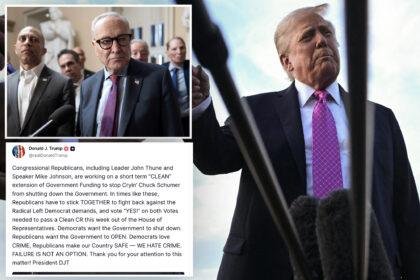Virginia Political Landscape Shaken by Controversial Texts: A Call for Unity Amidst Division
In a politically charged atmosphere, Virginia’s Democratic Representative Yevgeny “Eugene” Vindman has publicly rallied support for fellow Democrats Jay Jones and Abigail Spanberger, following the emergence of controversial texts linked to Jones. These texts, which reportedly included violent rhetoric against Republicans, have ignited a firestorm of criticism and debate, underscoring the increasingly polarized nature of American politics.
The Controversy Unfolds
The controversy erupted over the weekend when texts surfaced showing Jay Jones, a candidate for Attorney General, making alarming comments about the murder of then-Virginia House Speaker Todd Gilbert, a Republican. The fallout was immediate, with calls for Jones to step down from his candidacy. Virginia Governor Glenn Youngkin was among those demanding accountability, stating that Jones should “step away in disgrace” due to the gravity of his remarks.
In the wake of this scandal, Rep. Eugene Vindman took to social media to express his unwavering support for the Democratic ticket. “We’re just a month out from Election Day in Virginia. It’s time for our Commonwealth to send a message that we’re tired of Republican chaos,” he tweeted, emphasizing the importance of voter participation in the upcoming elections.
Historical Context of Political Rhetoric
Political rhetoric in the United States has a long and tumultuous history, often reflecting the societal tensions of the time. From the fiery debates of the early republic to the divisive campaigns of the modern era, the language used by politicians can have profound implications. The current situation in Virginia serves as a stark reminder of how quickly political discourse can devolve into threats and violence, echoing past instances where heated rhetoric led to real-world consequences.
The emergence of social media has further complicated this landscape, allowing for rapid dissemination of information-and misinformation. The immediacy of platforms like X (formerly Twitter) means that statements can be amplified or condemned within moments, often without the context necessary for informed discussion.
Responses from Political Figures
Virginia Senator Tim Kaine, a prominent Democrat, defended Jones, asserting that the comments were out of character and that Jones had issued an apology. “I think those statements were not in character, and he has apologized,” Kaine remarked, calling for a more civil political discourse. His defense highlights a broader trend among some politicians who seek to separate individual actions from party affiliation, even in the face of serious allegations.
Conversely, the backlash against Jones has been fierce. Critics have taken to social media to express their outrage, with some labeling him as “Jay ‘Two Bullet’ Jones” in reference to his comments. The public’s reaction underscores a growing intolerance for violent rhetoric in political discourse, regardless of party lines.
Local Reactions and Political Fallout
In a striking display of loyalty, Melody Cartwright, a Democratic candidate in Pittsylvania County, has doubled down on her support for Jones despite the controversy. “Jay Jones will defend Virginia’s rights, healthcare, and education. Stay the course,” she tweeted, urging her followers to remain steadfast. However, her comments have not gone unchallenged. Critics have accused her of endorsing a candidate who fantasizes about violence, further complicating her campaign.
Republican Delegate Eric Phillips, who previously defeated Cartwright, condemned her support for Jones, stating, “It’s disturbing and disgraceful for my opponent to defend Jay Jones’ vile comments.” His remarks reflect a broader sentiment among Republicans who view the incident as emblematic of a larger issue within the Democratic Party regarding accountability and the normalization of violent rhetoric.
The Broader Implications for Virginia Politics
As Virginia approaches its elections, the fallout from this controversy may have lasting implications for both parties. The incident has reignited discussions about the tone of political discourse and the responsibilities of candidates to uphold a standard of civility. With the state historically swinging between Democratic and Republican leadership, the outcome of the upcoming elections could hinge on how effectively candidates navigate these turbulent waters.
The situation also raises questions about the role of social media in shaping political narratives. As candidates and their supporters engage in increasingly aggressive rhetoric online, the potential for misinterpretation and backlash grows. This dynamic complicates the already fraught landscape of American politics, where every statement can be scrutinized and weaponized.
Conclusion: A Call for Reflection
The recent events in Virginia serve as a critical reminder of the need for thoughtful and responsible political discourse. As candidates prepare for the upcoming elections, the challenge will be to rise above the fray and engage in meaningful dialogue that prioritizes the well-being of constituents over partisan gain. The stakes are high, and the path forward will require a collective commitment to civility and respect in the political arena. As the state grapples with these issues, the eyes of the nation will undoubtedly be watching, eager to see how Virginia navigates this complex political landscape.










